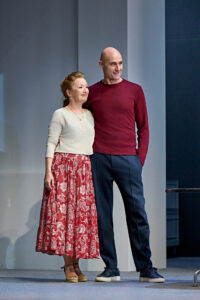A thrilling love story shattered by human fallibility
★★★★★

I love going to the theatre but I can’t deny that, while they offer the excitement of live performance, many evenings are transitory experiences- good at the time but not that memorable. Then, a production comes along that reminds you why you fell in love with theatre, and why at its best it’s a transcendent experience. A thrilling production like Robert Icke’s Oedipus, adapted from Sophocles‘ Ancient Greek tragedy and starring Mark Strong and Lesley Manville. For two hours, you are not only in the presence of two great actors, you are taken out of the here and now, into a timeless story of human experience.
First, we should pay tribute to Sophocles born over 2500 years ago and possibly the greatest playwright of all time. He wrote around 120 plays. Of the seven that survive, Oedipus, or Oedipus The King, is considered to be his finest. Sophocles provides the core of this production by showing the way Oedipus reacts to being the victim of a situation he only inadvertently caused.
Now, it will come as no surprise to you that the situation is, unbeknownst to him, he has killed his father and married his mother. And, if we didn’t know, we soon do because early on in the play, he meets someone who can foresee the future- Tiresias played by Samuel Brewer as someone frightened by his knowledge and reluctant to impart it. Oedipus, the truth seeker, insists so Tiesias tells him he will discover that he is the killer of his father and the lover of his mother. He laughs it off. After all, his father is still alive and his elderly mother is certainly not his wife.
In Robert Icke‘s interpretation, Oedipus is a modern day politican who, Obama-like, promises to be truthful and transparent- and means it. We meet him on election night, and await his almost certain victory in real time, as a clock counts down the seconds to the result. This is unbearably tense because the time is just a little less than the length of the play, which is without an interval, and which we are pretty sure will end badly
At the very start, Oedipus makes two rash decisions (rash in his advisor’s opinion). As there are doubts about his immigrant origins, he will release his birth certificate. Secondly, because there are rumours about how the last proper ruler King Laius, who was also his wife’s former husband, died 30 years earlier, he will conduct a public investigation. But sometimes the truth can be devastating and his well-intentioned decisions set off the inevitable conclusion.

Everything takes place in one indoor location, the election campaign headquarters. As well as a workplace, it is also the place where Oedipus’ family live. Hildegard Bechtler‘s clean, shiny, white set suggests both a modern office and the temporariness of life, which is an on-going theme of the play. As time ticks away, so the furnishings are gradually removed.
Oedipus’ mother Merope has something important to tell him. We suspect what this will be, but he keeps putting her off. She is played by June Watson as a world-weary but steely old woman. Meanwhile, we get hints of political intrigue when we meet Oedipus’ close advisor Creon, his brother-in-law, played with a certain shiftiness and exasperation by Michael Gould. Oedipus doesn’t trust him, partly because Tiresias has predicted Creon will become leader, and partly because, unlike him, Creon sees the potential dangers of transparency.
Heart bursting drama
Most importantly, we meet Oedipus’ wife, Jocasta, a little older than him, and whom he clearly loves. The passion is still strong even after thirty years: he gives her oral sex on stage and, when interrupted, they go off for a quickie. It’s a love that dominates the play. ‘Love,’ he proclaims, ‘is the only thing that matters in the end’. Like their characters, Mark Strong and Lesley Manville are a match made in heaven: they’re tactile, warm, honest, and at ease with each other. You can feel the erotic charge. Your heart bursts with the knowledge of what is to come, knowledge that will shatter their love story.
Then, there’s the loving family. They may bicker but they are relaxed together. Some of the audience may know that in other plays by Sophocles, the consequences of tonight will play out in further tragedy, including Antigone, which features his daughter, and is currently playing in a hardly recognisable modern version called The Other Place at the National Theatre. It seems we can’t get enough of Sophocles. There’s even another version of Oedipus coming to the Old Vic next year, featuring Rami Malek and Indira Varma.
They will have to do incredibly well to match Mark Strong and Lesley Manville. When they are on stage, you feel you are in the presence of greatness. Mark Strong carries himself with the confidence, strength and arrogance of a leader, upright with jutting jaw, but he is also able to show a full range of emotions from fear to temper to tenderness. Lesley Manville is a sparkling foil to him. She laughs, she’s seductive, she’s protective, she tries to persuade him to leave well alone. When she talks of becoming pregnant at 13 and having the baby taken away, it’s a pin-drop moment of the deepest emotion, and made all the worse because we know who that baby is.
The tension is palpable as Oedipus’ determination to discover and reveal the truth leads him first to connect an accident he was involved in as a young man with the death of his wife’s despicable husband King Laius, and then to the much worse truth about his own origins.
Yes, the coincidences are a bit much, both in Sophocles‘ original and in Robert Icke‘s adaptation, but the ticking clock allows us no time to question the plot. We may not be cursed by the Ancient Greek Gods, but this play tells us we are all trapped by circumstances beyond our control from birth to death. We realise that Oedipus’ tragedy is not that he unknowingly killed his father and married his mother, it’s that his only too human quest for answers, without thought to the consequences of that knowledge, leads him to find out a shocking truth about himself. In a heartbreaking scene, we’re even reminded how different it could have been if he had made other choices.
It all comes back to being human, which I think is at the heart of theatre because of its human scale. There is a scene between Creon and Antigone in which they discuss a riddle, that is in fact the Riddle of The Sphinx, the one which made Oedipus a hero when he solved it. The answer to the riddle is, significantly, a human being.
As Oedipus’ mother says, ‘It was a struggle to get here. A struggle to be here. What can it be but a struggle to leave.’ Sophocles recognised the nature of the human condition, and Robert Icke, as adaptor and director, has laid it out again for us, magnificently.
Oedipus is at the Wyndham’s Theatre until 4 January 2025. Buy tickets direct from the theatre.
Paul bought his own ticket.
Click here to watch this review on our YouTube channel Theatre Reviews With Paul Seven
Click here to read a roundup of critics’ reviews of Oedipus


